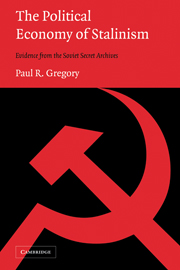Book contents
- Frontmatter
- Contents
- Illustrations
- Tables
- Preface
- 1 The Jockey or the Horse?
- 2 Collectivization, Accumulation, and Power
- 3 The Principles of Governance
- 4 Investment, Wages, and Fairness
- 5 Visions and Control Figures
- 6 Planners Versus Producers
- 7 Creating Soviet Industry
- 8 Operational Planning
- 9 Ruble Control: Money, Prices, and Budgets
- 10 The Destruction of the Soviet Administrative-Command Economy
- 11 Conclusions
- Appendix A Archival Sources
- Appendix B The Structure of the State
- Bibliography
- Index
8 - Operational Planning
Published online by Cambridge University Press: 03 December 2009
- Frontmatter
- Contents
- Illustrations
- Tables
- Preface
- 1 The Jockey or the Horse?
- 2 Collectivization, Accumulation, and Power
- 3 The Principles of Governance
- 4 Investment, Wages, and Fairness
- 5 Visions and Control Figures
- 6 Planners Versus Producers
- 7 Creating Soviet Industry
- 8 Operational Planning
- 9 Ruble Control: Money, Prices, and Budgets
- 10 The Destruction of the Soviet Administrative-Command Economy
- 11 Conclusions
- Appendix A Archival Sources
- Appendix B The Structure of the State
- Bibliography
- Index
Summary
“At the meeting of the Politburo's transport commission it came out that the ministry of transportation does not know its plan at all, although even in current circumstances, it must know its plan.”
Kaganovich to Stalin, August 30, 1933“We protest the excessively frequent changes in the plan for the third quarter for the production of rails, which, in the period June–July, has been changed six times. Such orders completely disorient the factory and lead to breakdowns in plan fulfillment.”
Director of Makeevsky Metallurgical Combine to Ministry of Heavy Industry, July 22, 1937Our placement of operational planning near the end is remarkable, considering that planning was one of the three core principles of the administrative-command system. Selected aspects of planning have been mentioned. We showed that long-term planning served primarily motivational rather than resource-allocation functions (see Chapter 5). Chapter 3 explained that Stalin was highly distrustful of planning experts whom he accused of turning the Politburo into a “council of elders” making only general decisions, and that his principal rival, Trotsky, favored consolidation of resource-allocation power in the hands of specialists, not party loyalists. Earlier chapters confirmed Zaleski's dismissal of scientific planning: Chapter 6 showed the tensions between Gosplan and the industrial ministries over information needed for planning, the arbitrary ad hoc interventions in plans, the fight for generalized plans, the ministry practice of dual planning and nonplanning, and the outright deception of planners. Scientific planning was also unwelcome from a political point of view.
- Type
- Chapter
- Information
- The Political Economy of StalinismEvidence from the Soviet Secret Archives, pp. 183 - 212Publisher: Cambridge University PressPrint publication year: 2003



